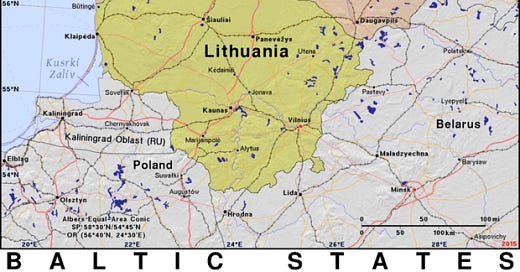Lithuania, Poland, Latvia, and Estonia Defense Ministers Recommend Withdrawal from Ottawa Convention Citing Deteriorating Security Environment
Also, on March 11, two US B-52H Stratofortress aircraft, assigned to the 69th Expeditionary Bomb Squadron and deployed at RAF Fairford, England, conducted the first live weapons drop in Sweden.
EUROPE - On March 18, 2025, the defense ministers of Lithuania, Poland, Latvia, and Estonia jointly recommended that their governments withdraw from the Convention on the Prohibition of the Use, Stockpiling, Production, and Transfer of Anti-Personnel Mines, known as the Ottawa Convention.
The statement was signed by Lithuanian Defense Minister Dovilė Šakalienė, Polish Deputy Prime Minister and Defense Minister Władysław Kosiniak-Kamysz, Latvian Defense Minister Andris Sprūds, and Estonian Defense Minister Hanno Pevkur.
Concurrently, the Lithuanian Ministry of Defense issued a release stating that the four countries "have announced their withdrawal," though the ministers’ text specifies a recommendation rather than a completed action.
The Ottawa Convention, enacted in 1997 and ratified by 164 states as of 2022, bans the use, production, stockpiling, and transfer of anti-personnel mines. The ministers cited a deteriorated security environment near Russia and Belarus, NATO members’ neighbors, as the basis for their recommendation.
They stated that withdrawal would allow their defense forces greater flexibility to adopt systems and solutions to strengthen NATO’s Eastern Flank, amid increased military threats from these neighboring countries.
The recommendation does not indicate a finalized withdrawal. Under the treaty’s Article 20, withdrawal requires formal notification and a six-month waiting period. In Lithuania, this involves approval from the State Defense Council and parliament.
In Poland, the president authorizes treaty withdrawals, subject to governmental processes. Latvia and Estonia follow similar legislative steps. The ministers noted plans to consult NATO allies and regional partners to coordinate this approach.
The Four Countries Affirmed Their Commitment To International Humanitarian Law, Including Civilian Protection During Armed Conflicts, Finland, Other NATO Members Bordering Russia Reviewing Stance
Keep reading with a 7-day free trial
Subscribe to The Standeford Journal - News, Intel Analysis to keep reading this post and get 7 days of free access to the full post archives.







